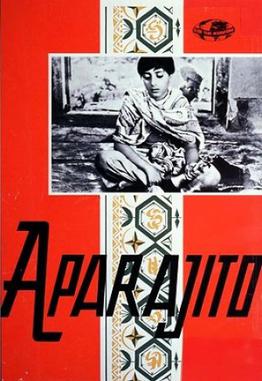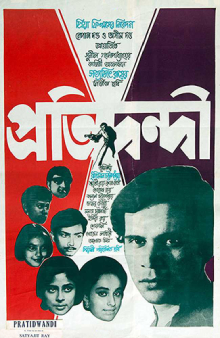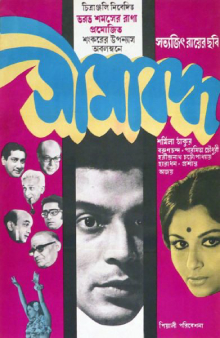A trilogy is a set of three distinct works that are connected and can be seen either as a single work or as three individual works. They are commonly found in literature, film, and video games. Three-part works that are considered components of a larger work also exist, such as the triptych or the three-movement sonata, but they are not commonly referred to with the term "trilogy".

Dario Argento is an Italian film director, screenwriter and producer. His influential work in the horror genre during the 1970s and 1980s, particularly in the subgenre known as giallo, has led him to being referred to as the "Master of the Thrill" and the "Master of Horror".

The Apu Trilogy comprises three Indian Bengali-language drama films directed by Satyajit Ray: Pather Panchali (1955), Aparajito (1956) and The World of Apu (1959). The original music for the films was composed by Ravi Shankar.

Pather Panchali is a 1955 Indian Bengali-language drama film written and directed by Satyajit Ray in his directoral debut and produced by the Government of West Bengal. It is an adaptation of Bibhutibhushan Bandyopadhyay's 1929 Bengali novel of the same name and features Subir Banerjee, Kanu Banerjee, Karuna Banerjee, Uma Dasgupta, Pinaki Sengupta and Chunibala Devi in major roles. The first film in The Apu Trilogy, Pather Panchali depicts the childhood travails of the protagonist Apu and his elder sister Durga amidst the harsh village life of their poor family.
A Hobbit is a fictional creature created by the author J. R. R. Tolkien.

Aparajito is a 1956 Indian Bengali-language drama film written and directed by Satyajit Ray, and is the second part of The Apu Trilogy. It is adapted from the first half of Bibhutibhushan Bannerjee's novel Aparajito. It starts off where the previous film Pather Panchali (1955) ended, with Apu's family moving to Varanasi, and chronicles Apu's life from childhood to adolescence in college.

Apur Sansar, also known as The World of Apu, is a 1959 Indian Bengali-language drama film produced, written and directed by Satyajit Ray. It is based on the second half of Bibhutibhushan Bandopadhyay's novel Aparajito. Following Pather Panchali (1955) and Aparajito (1956), The World of Apu is the final part of Ray's The Apu Trilogy, about the childhood and early adulthood of a young Bengali named Apu in early twentieth century India. The World of Apu stars Soumitra Chatterjee and Sharmila Tagore ; the duo would go on to appear in many subsequent Ray films.
Calcutta is the former anglicised name of the city of Kolkata in the state of West Bengal in India.

Madhabi Chakraborty is an Indian actress. She won the National Film Award for Best Actress for her performance in the Bengali film Dibratrir Kabya. She has acted in some of the most critically acclaimed films in Bengali cinema and is considered one of the great actresses of Bengali cinema.
Paul Bogart was an American television director and producer. Bogart directed episodes of the television series 'Way Out in 1961, Coronet Blue in 1967, Get Smart, The Dumplings in 1976, All In The Family from 1975 to 1979, Mama Malone in 1982, and four episodes of the first season of The Golden Girls in 1985. Among his films are Oh, God! You Devil, Torch Song Trilogy, Halls of Anger, Marlowe, Skin Game, and Class of '44. He won five Primetime Emmy Awards during his long career, from sixteen nominations. In 1991, he was awarded the French Festival Internationelle Programmes Audiovisuelle at the Cannes Film Festival.

Pratidwandi is a 1970 Indian Bengali drama film written and directed by Satyajit Ray based on the novel by Sunil Gangopadhyay. It is the first part of the Calcutta trilogy. Pratidwandi tells the story of Siddharta, an educated middle-class man caught up in the turmoil of social unrest. Corruption and unemployment are rampant, and Siddhartha cannot align himself with either his revolutionary activist brother or his career-oriented sister. The film is known for experimenting with techniques such as photo-negative flashbacks.

Seemabaddha is a 1971 social drama Bengali film directed by Satyajit Ray. It is based on the novel Seemabaddha by Mani Shankar Mukherjee. It stars Barun Chanda, Harindranath Chattopadhyay, and Sharmila Tagore in lead roles. The film was the second entry in Ray's Calcutta trilogy, which included Pratidwandi (1970) and Jana Aranya (1976). The films deal with the rapid modernization of Calcutta, rising corporate culture and greed, and the futility of the rat race. The film won the FIPRESCI Award at the 33rd Venice International Film Festival, and the National Film Award for Best Feature Film in 1971.
Subrata Mitra was an Indian cinematographer. Acclaimed for his work in The Apu Trilogy (1955–1959), Mitra often is considered one of the greatest Indian cinematographers.

Karuna Banerjee was a Bengali actress best known for her role in Satyajit Ray's The Apu Trilogy (1955–1959) as the long suffering mother, Sarbajaya. She was nominated for Best Actress at the 1959 BAFTA Awards for her performance in Aparajito (1956), the second part of The Apu Trilogy. She appeared in a number of other films after that, including Ray's Devi (1960) and Kanchenjungha (1962).

Satyajit Ray was an Indian director, screenwriter, documentary filmmaker, author, essayist, lyricist, magazine editor, illustrator, calligrapher, and composer. Ray is widely considered one of the greatest and most influential film directors in the history of cinema. He is celebrated for works including The Apu Trilogy (1955–1959), The Music Room (1958), The Big City (1963), Charulata (1964), and the Goopy–Bagha trilogy (1969–1992).[a]

Cinema of West Bengal, also known as Tollywood or Bengali cinema, is an Indian film industry of Bengali-language motion pictures. It is based in the Tollygunge region of Kolkata, West Bengal, India. The origins of the nickname Tollywood, a portmanteau of the words Tollygunge and Hollywood, dates back to 1932. It was a historically important film industry, at one time the centre of Indian film production. The Bengali film industry is known for producing many of Indian cinema's most critically acclaimed global Parallel Cinema and art films, with several of its filmmakers gaining prominence at the Indian National Film Awards as well as international acclaim.
Interview was a 1971 Bengali film directed by noted Indian art film director Mrinal Sen. A path-breaking film in terms of narrative innovation and cinematic technique, it was a commercial and critical success. It also happened to be the debut film of Ranjit Mallick. Although it was a film on the colonial hangover, it touched upon diverse issues like anti-establishment, middle class cowardice, and unemployment.

Padatik is a 1973 Bengali drama film directed by noted Parallel Cinema director Mrinal Sen, under the banner of Mrinal Sen Productions.

Ottavia Piccolo is an Italian actress.

The Three Flavours Cornetto trilogy is an anthology series of British comedic genre films directed by Edgar Wright, written by Wright and Simon Pegg, and produced by Nira Park. The series stars Pegg and Nick Frost, with several other actors, including Bill Nighy, Rafe Spall and Martin Freeman, also appearing in all three films. The trilogy consists of Shaun of the Dead (2004), Hot Fuzz (2007), and The World's End (2013).













